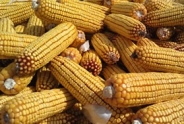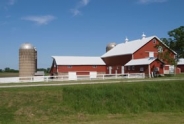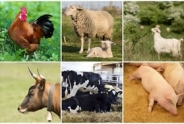Grains
 The Field Crops Program provides research-based field crop production recommendations and resources. Assistance is accessible through educational programs, fact sheets, bulletins, articles, websites and individual contacts through on-farm visits to meet the needs of the producers. The field crop program is also very active with on farm agronomic research and demonstration projects. The goal is to improve crop production efficiency through increased yields, improved quality, decreased input costs, protected yields and new technologies.
The Field Crops Program provides research-based field crop production recommendations and resources. Assistance is accessible through educational programs, fact sheets, bulletins, articles, websites and individual contacts through on-farm visits to meet the needs of the producers. The field crop program is also very active with on farm agronomic research and demonstration projects. The goal is to improve crop production efficiency through increased yields, improved quality, decreased input costs, protected yields and new technologies. GRAINS CATEGORIES
Fall Burndown Weed Control Options
Mike Hunter, Field Crops Specialist
North Country Regional Ag Team
Ear to Ground - July 2022
Kitty O'Neil, Team Leader, Field Crops & Soils Specialist
North Country Regional Ag Team
Burndown herbicide options in no till soybeans
Mike Hunter, Field Crops Specialist
North Country Regional Ag Team
Last Minute Prep for 2022 Spring Crops
Kitty O'Neil, Team Leader, Field Crops & Soils Specialist
North Country Regional Ag Team
Spring planting season is fast approaching, but there's time for some last-minute preparations. While we always prioritize efficient use of fertilizers, seed and other inputs, 2022 pricing and availability puts and extra importance on this strategy. How many items can you cross off this to-do list?
Planting Enlist E3 soybeans in 2022?
Mike Hunter, Field Crops Specialist
North Country Regional Ag Team
Are you planting Enlist E3 soybeans in 2022? If so, one of the tools in the weed control toolbox will be the option to use one of the two registered 2,4-D choline herbicides for use on Enlist E3 soybeans. In January 2022, the EPA approved a seven-year registration of Enlist One and Enlist Duo herbicides. Enlist One and Enlist Duo are the only 2,4-D choline herbicides registered for over-the-top use in 2,4-D tolerant soybeans. Enlist E3 soybeans are also tolerant to the over-the-top application of both glyphosate (Roundup) and glufosinate (Liberty) herbicides.
Spring 2022 Weather Outlook
Kitty O'Neil, Team Leader, Field Crops & Soils Specialist
North Country Regional Ag Team
We begin the 2022 growing season in NNY with no drought classifications, for a welcome change. Our snow has mostly melted and soil frost is on the decline. The North Country is a tiny bit behind normal soil moisture as of this date in late March, but the deficit is small. March temperatures have been just a bit warmer than average so far.
Kitty O'Neil, Team Leader, Field Crops & Soils Specialist
North Country Regional Ag Team
Managing Corn Rootworm in NY to delay Bt resistance (& save seed costs)
NNY Receives Official "Abnormally Dry" Classification, May 19, 2020
Kitty O'Neil, Team Leader, Field Crops & Soils Specialist
North Country Regional Ag Team
Burndown herbicide options in no till soybeans and corn
Mike Hunter, Field Crops Specialist
North Country Regional Ag Team
Interim Guidance for Horticulture
NNYADP: New Way to Apply Biocontrol Nematodes
Potential Pitfalls of Growing Soybean after Soybean
Young Farm Entrepreneur Applying NNYADP Biocontrol Research Results
Guidance for the Horticulture Industry
Kelsey O'Shea, Agriculture Business Development
North Country Regional Ag Team

How to Manange COVID-19 Risks on Dairy Farms
Soybean Cyst Nematode Now Confirmed in Six Additional Counties in New York
Mike Hunter, Field Crops Specialist
North Country Regional Ag Team
Ear to Ground November 20,2019
Winter Grain Crop Insurance Deadline
Kelsey O'Shea, Agriculture Business Development
North Country Regional Ag Team
Beginning Producer Benefits for Crop Insurance
PRODAIRY e-Alert Bunker and Silo Safety
Lindsay Ferlito, Dairy Management
North Country Regional Ag Team

Biological Control of Alfalfa Snout Beetle: An Update after a Decade of Nematode
Paraquat Certified Applicator Training to Prevent Poisonings Now Available
Mike Hunter, Field Crops Specialist
North Country Regional Ag Team
Rye Cover Crop Termination 2019
Mike Hunter, Field Crops Specialist
North Country Regional Ag Team
What are Mycorrhizae and Should They Factor into Your Crop Management Plans?
Kitty O'Neil, Team Leader, Field Crops & Soils Specialist
North Country Regional Ag Team
You can Never be too prepared for an Emergency
Lindsay Ferlito, Dairy Management
North Country Regional Ag Team
Get to Know Herbicide Sites of Action
Mike Hunter, Field Crops Specialist
North Country Regional Ag Team
New Online Crop Maturity Planning Tool
Kitty O'Neil, Team Leader, Field Crops & Soils Specialist
North Country Regional Ag Team
When Planting Goes Wrong....
Kelsey O'Shea, Agriculture Business Development
North Country Regional Ag Team

2017 NYS & VT Corn Silage Trial Data Tables
We received the rest of the data back from Cumberland Valley Analytical Services today and I am attaching a preliminary report containing the data tables and basic information on the trials. We will be working on analyzing the data from predicted milk yields with the Cornell Net Carbohydrate and Protein System (CNCPS) model in the coming weeks and will provide a full report with that information once complete.
Don't Ignore Marestail!
Mike Hunter, Field Crops Specialist
North Country Regional Ag Team
Is Your Corn Rusty?
Mike Hunter, Field Crops Specialist
North Country Regional Ag Team
2017 NY Farmer Heavy Rainfall Survey
Kitty O'Neil, Team Leader, Field Crops & Soils Specialist
North Country Regional Ag Team
Delayed Pre-Emerge Tank Mixes for Corn
Mike Hunter, Field Crops Specialist
North Country Regional Ag Team
NYS Regist. Insecticides Labeled for Cutworm, WBC/and or Black Cutworm on Corn
Kitty O'Neil, Team Leader, Field Crops & Soils Specialist
North Country Regional Ag Team
Conventional Corn Weed Control
Mike Hunter, Field Crops Specialist
North Country Regional Ag Team
Over the winter there were a lot of growers asking me about conventional corn weed control options. Some growers are looking to capture potential non-GMO corn premiums, dairy producers are intrigued by the possible GMO free milk markets, others are looking to save money on seed costs and some feel that they need to become more proactive with their herbicide resistance management strategies on the farm.
Regardless of a growers' reason to plant conventional corn, preemergence weed control programs are almost a necessity for a conventional weed control program. It is extremely difficult to rely on a total postemergence conventional weed control program. There is a high risk of yield loss if the postemergence application is delayed. Application delays due to weather conditions can lead to tall weeds that are difficult or too big to control.
Conventional Soybean Control Revisted
Mike Hunter, Field Crops Specialist
North Country Regional Ag Team
Glyphosate resistant (Roundup Ready) soybeans made postemergence weed control relatively easy with a single application. Recently, there have been a renewed interest in conventional soybean weed control options. Many of these soybean growers haven't planted conventional soybeans in well over a decade and the younger soybean growers have never planted conventional soybeans.
Regardless of a growers' reason to plant conventional soybeans, preemergence weed control programs are almost a necessity for growing conventional soybeans. It is extremely difficult to rely on a total postemergence conventional soybean weed control program. We have limited options for controlling broadleaf weeds with conventional soybean herbicides. It is imperative that we start out with a preemergence herbicide before or at time of planting and then be ready to apply a postemergence application to any weeds that escape. Timing of conventional postemergence soybean herbicides is critical because they won't kill big weeds.
Managing Western Bean Cutworm with Bt's - A Reality Check

The Western Bean Cutworm (WBC) is an emerging pest in NY that has the potential to cause economic losses in field corn, sweet corn and dry beans. Since 2010, the presence of WBC moths throughout the state have been monitored using bucket traps with pheromone lures. Based on these WBC trap monitoring efforts, Northern New York (NNY) is considered a "hot spot" for the Western Bean Cutworm in New York State.
2017 Cornell Guide for Integrated Field Crop Management Now Available
Kitty O'Neil, Team Leader, Field Crops & Soils Specialist
North Country Regional Ag Team

The 2017 edition of the Cornell Guide for Integrated Field Crop Management is now available. This annual publication provides up-to-date field crop production information for New York State. It is designed as a practical guide for field crop producers, crop consultants, ag chemical dealers, and others who advise field crop producers.
Not to Early to Plan Your Corn Weed Control
Mike Hunter, Field Crops Specialist
North Country Regional Ag Team

NNY Ear to the Ground
Kitty O'Neil, Team Leader, Field Crops & Soils Specialist
North Country Regional Ag Team
Ear to the Ground
Kitty O'Neil, Team Leader, Field Crops & Soils Specialist
North Country Regional Ag Team
Be on the Lookout for Horseweed...A.K.A Marestail
Mike Hunter, Field Crops Specialist
North Country Regional Ag Team

How will El Nino Impact our Crops in 2016?
Mike Hunter, Field Crops Specialist
North Country Regional Ag Team
USDA Guide for Organic Crop Producers
Bill Verbeten, Field Crops
Northwest New York Dairy, Livestock & Field Crops

Thinking about transitioning some acres to organic production? Already an organic crop farmer and need to review some information? Check out the USDA Guide for Organic Crop Producers in the PDF below.
Announcements
No announcements at this time.





